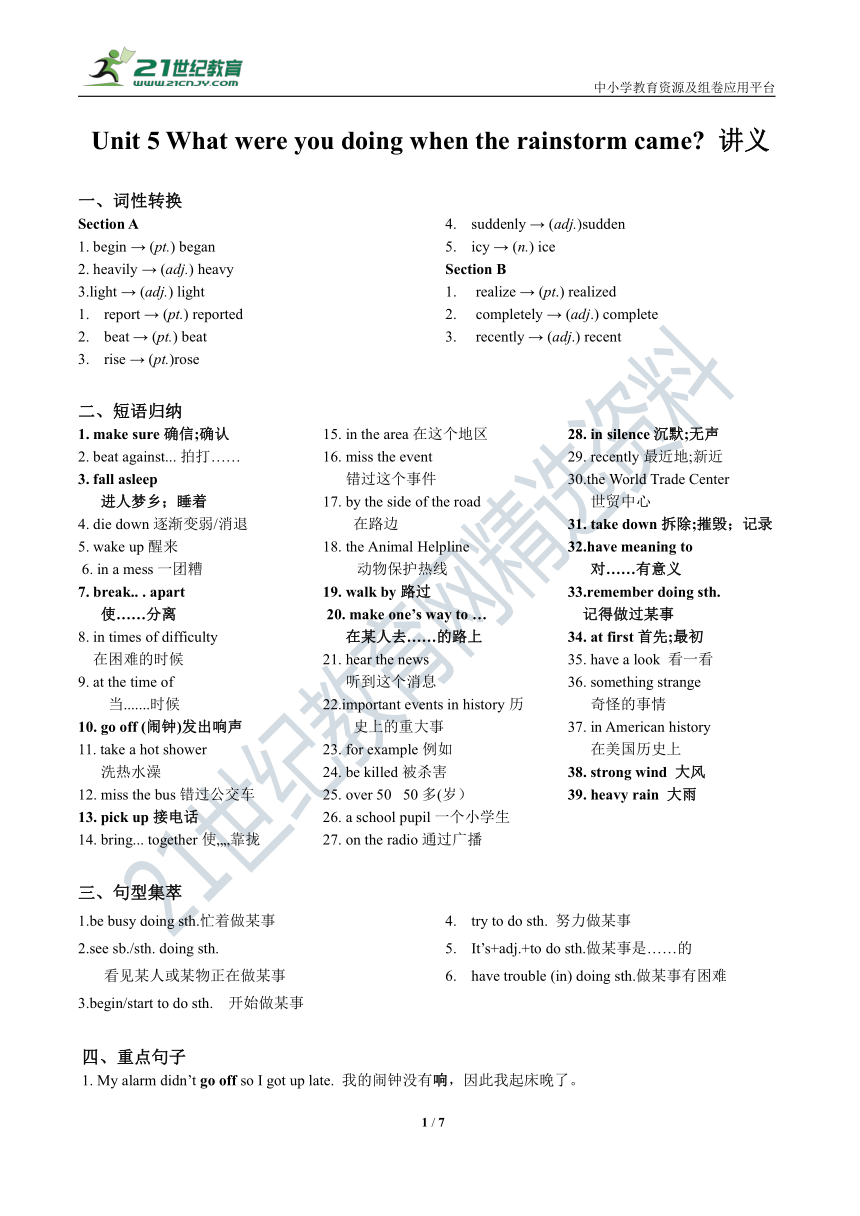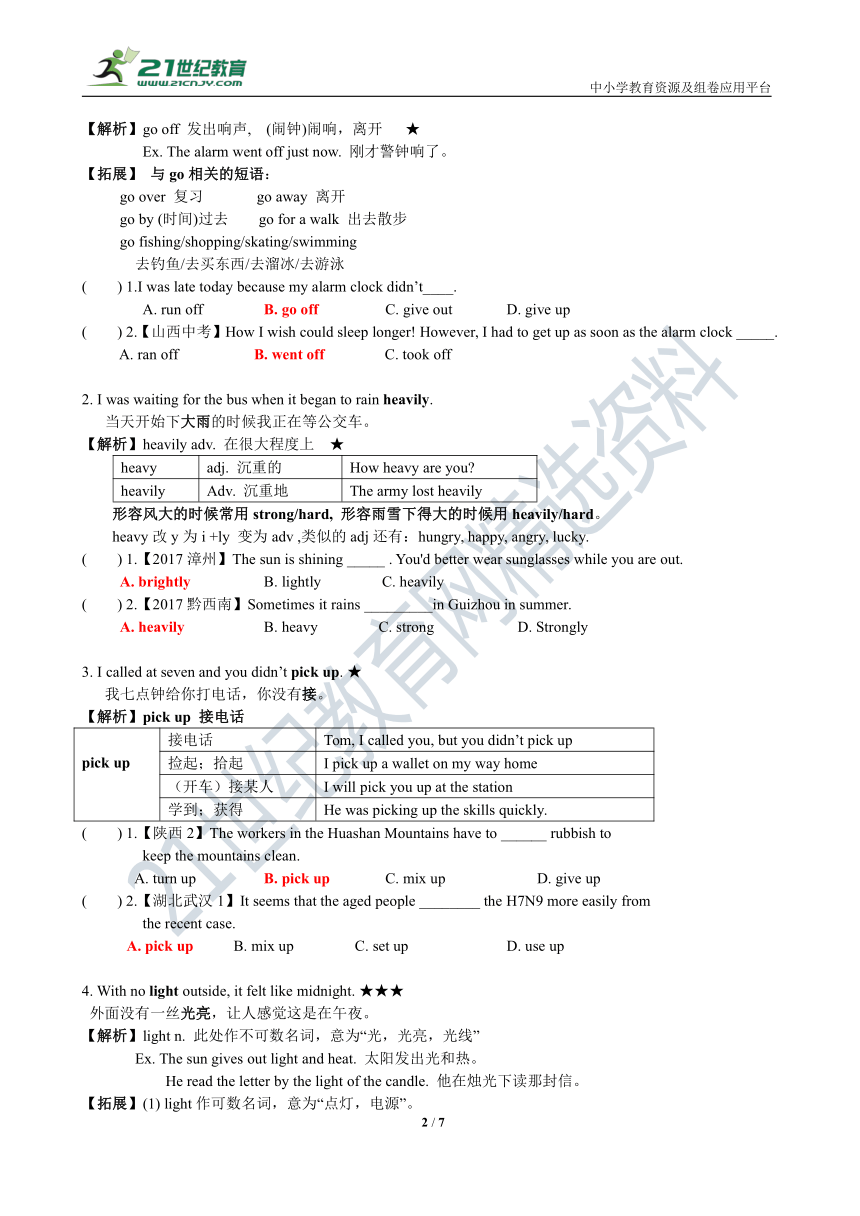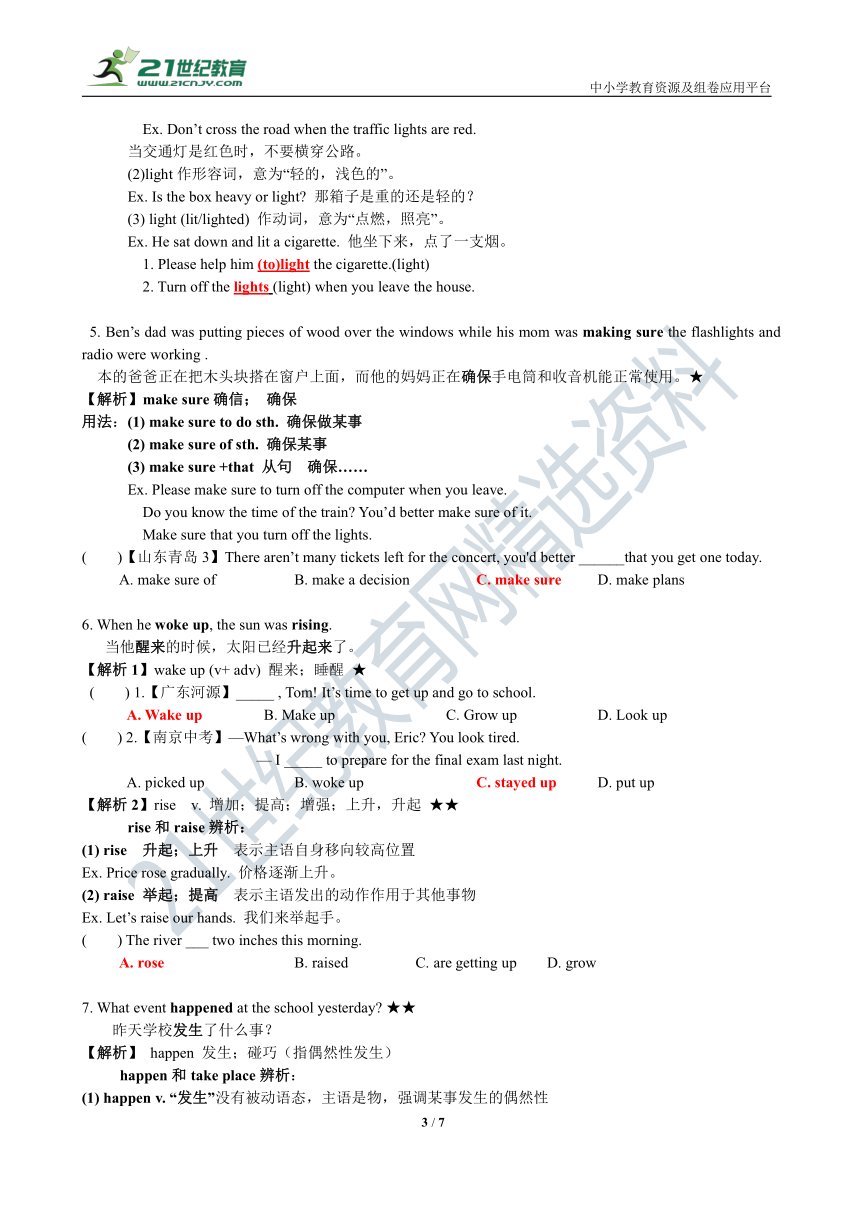Unit 5 What were you doing when the rainstorm came ?单元知识点讲义
文档属性
| 名称 | Unit 5 What were you doing when the rainstorm came ?单元知识点讲义 |  | |
| 格式 | zip | ||
| 文件大小 | 1.2MB | ||
| 资源类型 | 试卷 | ||
| 版本资源 | 人教新目标(Go for it)版 | ||
| 科目 | 英语 | ||
| 更新时间 | 2020-02-04 19:07:42 | ||
图片预览



文档简介
中小学教育资源及组卷应用平台
Unit 5 What were you doing when the rainstorm came? 讲义
一、词性转换
Section A
1. begin → (pt.) began
2. heavily → (adj.) heavy
3.light → (adj.) light
report → (pt.) reported
beat → (pt.) beat
rise → (pt.)rose
suddenly → (adj.)sudden
icy → (n.) ice
Section B
realize → (pt.) realized
completely → (adj.) complete
recently → (adj.) recent
二、短语归纳
1.?make?sure?确信;确认???
2.?beat?against...?拍打……
3.?fall?asleep?
进人梦乡;睡着?????????????
4.?die?down?逐渐变弱/消退?
5.?wake?up醒来????????????????????
?6.?in?a?mess?一团糟?
7.?break..?.?apart?
使……分离????????????
8.?in?times?of?difficulty?
在困难的时候?
9.?at?the?time?of?
当.......时候??????????
10.?go?off?(闹钟)发出响声?
11.?take?a?hot?shower?
洗热水澡???????????
12.?miss?the?bus?错过公交车?
13.?pick?up?接电话
14.?bring...?together?使??靠拢?
15.?in?the?area?在这个地区?????
16.?miss?the?event?
错过这个事件?
17.?by?the?side?of?the?road?
在路边???????
18.?the?Animal?Helpline
?动物保护热线?
19.?walk?by?路过
?20.?make?one’s?way?to …?
在某人去……的路上?
21.?hear?the?news?
听到这个消息???
22.important?events?in?history?历史上的重大事?
23. for?example?例如?????????????
24. be?killed?被杀害?
25.?over?50? 50多(岁)???????????
26.?a?school?pupil?一个小学生?
27.?on?the?radio?通过广播????????
28.?in?silence?沉默;无声?
29. recently?最近地;新近????
30.the?World?Trade?Center?
世贸中心?
31.?take?down?拆除;摧毁;记录
32.have?meaning?to?
对……有意义?
33.remember?doing?sth.?
记得做过某事???
34.?at?first?首先;最初?
35. have a look 看一看
36. something strange
奇怪的事情
37. in American history
在美国历史上
38. strong wind 大风
39. heavy rain 大雨
三、句型集萃
1.be busy doing sth.忙着做某事
2.see sb./sth. doing sth.
看见某人或某物正在做某事
3.begin/start to do sth. 开始做某事
try to do sth. 努力做某事
It’s+adj.+to do sth.做某事是……的
have trouble (in) doing sth.做某事有困难
四、重点句子
1. My alarm didn’t go off so I got up late. 我的闹钟没有响,因此我起床晚了。
【解析】go off 发出响声, (闹钟)闹响,离开 ★
Ex. The alarm went off just now. 刚才警钟响了。
【拓展】 与go相关的短语:
go over 复习 go away 离开
go by (时间)过去 go for a walk 出去散步
go fishing/shopping/skating/swimming
去钓鱼/去买东西/去溜冰/去游泳
( ) 1.I was late today because my alarm clock didn’t____.
A. run off B. go off C. give out D. give up
( ) 2.【山西中考】How I wish could sleep longer! However, I had to get up as soon as the alarm clock _____.
A. ran off B. went off C. took off
2. I was waiting for the bus when it began to rain heavily.
当天开始下大雨的时候我正在等公交车。
【解析】heavily adv. 在很大程度上 ★
heavy adj. 沉重的 How heavy are you?
heavily Adv. 沉重地 The army lost heavily
形容风大的时候常用strong/hard, 形容雨雪下得大的时候用heavily/hard。
heavy改y为i +ly 变为adv ,类似的adj还有:hungry, happy, angry, lucky.
( ) 1.【2017漳州】The sun is shining _____ . You'd better wear sunglasses while you are out.
A. brightly B. lightly C. heavily
( ) 2.【2017黔西南】Sometimes it rains _________in Guizhou in summer.
A. heavily B. heavy C. strong D. Strongly
3. I called at seven and you didn’t pick up. ★
我七点钟给你打电话,你没有接。
【解析】pick up 接电话
pick up 接电话 Tom, I called you, but you didn’t pick up
捡起;拾起 I pick up a wallet on my way home
(开车)接某人 I will pick you up at the station
学到;获得 He was picking up the skills quickly.
( ) 1.【陕西2】The workers in the Huashan Mountains have to ______ rubbish to
keep the mountains clean.
A. turn up B. pick up C. mix up D. give up
( ) 2.【湖北武汉1】It seems that the aged people ________ the H7N9 more easily from
the recent case.
A. pick up B. mix up C. set up D. use up
4. With no light outside, it felt like midnight. ★★★
外面没有一丝光亮,让人感觉这是在午夜。
【解析】light n. 此处作不可数名词,意为“光,光亮,光线”
Ex. The sun gives out light and heat. 太阳发出光和热。
He read the letter by the light of the candle. 他在烛光下读那封信。
【拓展】(1) light作可数名词,意为“点灯,电源”。
Ex. Don’t cross the road when the traffic lights are red.
当交通灯是红色时,不要横穿公路。
(2)light作形容词,意为“轻的,浅色的”。
Ex. Is the box heavy or light? 那箱子是重的还是轻的?
(3) light (lit/lighted) 作动词,意为“点燃,照亮”。
Ex. He sat down and lit a cigarette. 他坐下来,点了一支烟。
1. Please help him (to)light the cigarette.(light)
2. Turn off the lights (light) when you leave the house.
5. Ben’s dad was putting pieces of wood over the windows while his mom was making sure the flashlights and radio were working .
本的爸爸正在把木头块搭在窗户上面,而他的妈妈正在确保手电筒和收音机能正常使用。★
【解析】make sure确信; 确保
用法:(1) make sure to do sth. 确保做某事
(2) make sure of sth. 确保某事
(3) make sure +that 从句 确保……
Ex. Please make sure to turn off the computer when you leave.
Do you know the time of the train? You’d better make sure of it.
Make sure that you turn off the lights.
( )【山东青岛3】There aren’t many tickets left for the concert, you'd better ______that you get one today.
A. make sure of B. make a decision C. make sure D. make plans
6. When he woke up, the sun was rising.
当他醒来的时候,太阳已经升起来了。
【解析1】wake up (v+ adv) 醒来;睡醒 ★
( ) 1.【广东河源】_____ , Tom! It’s time to get up and go to school.
A. Wake up B. Make up C. Grow up D. Look up
( ) 2.【南京中考】—What’s wrong with you, Eric? You look tired.
— I _____ to prepare for the final exam last night.
A. picked up B. woke up C. stayed up D. put up
【解析2】rise v. 增加;提高;增强;上升,升起 ★★
rise和raise辨析:
(1) rise 升起;上升 表示主语自身移向较高位置
Ex. Price rose gradually. 价格逐渐上升。
(2) raise 举起;提高 表示主语发出的动作作用于其他事物
Ex. Let’s raise our hands. 我们来举起手。
( ) The river ___ two inches this morning.
A. rose B. raised C. are getting up D. grow
7. What event happened at the school yesterday? ★★
昨天学校发生了什么事?
【解析】 happen 发生;碰巧(指偶然性发生)
happen和take place辨析:
(1) happen v. “发生”没有被动语态,主语是物,强调某事发生的偶然性
用法:sth. happen to sb. 某事发生在某人身上
sb. happen to do sth. 某人碰巧做某事
Ex. What happened to you?=What was wrong with him?
She happened to be out when we called.
(2) take place 发生,指事情有计划有安排地发生
Ex. The sports meeting took place in our school last week.
( ) 1. An accident ____ at the school gate this morning.
A. happened B .happened to C. took place D. took places
( ) 2.What happened _____ the boy?
A. with B. to C. at D. on
( ) 3.A serious bike accident ____ her , and she was badly hurt.
A. happened to B. was happened to C. was happening D. was happen
( ) 4.【山东临沂】The Olympic Games of 2016 will _____ in Brazil.
A. take after B. take off C. take place D. take away
( ) 5.【山东济南】—It’s hot today, isn’t it?
—Yes, it is. Why not __________ your jacket?
A. take care B. take place C. take after D. take off
8. More recently , most Americans remember what they were doing when the World Trade Center in New York was taken down by terrorists.
最近,大部分美国人还记得当纽约世贸大楼被恐怖分子袭击的时候自己在做什么。
【解析1】remember to do sth.与remember doing sth.的用法区别。★
(1)remember to do sth.记得去做某事(此事还未做)
Ex. Remember to turn off the light when you leave the room.
当你离开房间的时候记得关灯。
(2)remember doing sth.记得做过某事(此事已做完)
Ex. I remember turning off the light when I left the room.
我记得离开房间时关灯了。
【解析2】take down 拆掉;拆毁★
【解析3】terror n. 恐怖 → terrorist n. 恐怖分子★★
Ex. be full of terror充满恐怖
【拓展】 art n.艺术→ artist n.艺术家 science n. 科学→ scientist n. 科学家
piano n. 钢琴 →pianist n. 钢琴家
( )—Did you watch the TV news? The whole event was full of ____.
—Yes, I did . Those ____ were all caught by the police at last.
A. terror; terrorist B. terrorist; terrors
C. terror; terrorists D. terrors; terrorists
9. I was so scared that I could hardly think clearly after that. ★★
我是那么害怕以至于我几乎不能清楚地想象那之后的事。
【解析】hardly副词,意为“几乎不,几乎没有”,表示否定含义。
Ex. He hardly does the housework. 他几乎不做家务。
She was so excited that she could hardly sleep. 她如此兴奋,以至于几乎不能入睡。
hardly与hard辨析:
hardly 副词,意为“几乎不” He hardly watches TV. 他几乎不看电视。
hard 作形容词,意为“难的;硬的” 作副词,意为“努力地;猛烈地” She found it hard to decide.她发现难以决定。 We should work hard. 我们应当努力工作。
( )【 2017山东临忻】David was so excited at the good news that he could say a word.
A. nearly B. hard C. ever D. hardly
10. I had trouble thinking clearly after that because I was very afraid.
后来由于害怕我无法清晰地思考。★
【解析】trouble n 困难; 苦恼; 忧虑
用法:(1) in trouble 处于困境中 get sb. into trouble 使某人陷入困境
(2) What's the trouble with you ?
= What’s the matter with you ?
= What’s wrong with you ?你怎么啦?
(3) have trouble (in) doing sth. 做某事有麻烦
类似的表达还有:
have problem /difficulty (in) doing sth. 做某事有问题/困难
( ) 1. I had trouble ____ my homework.
A. to finish B. finishing C. finishes D. finish
( ) 2. —Mr. Wang, I have trouble ___ the text.
—Remember ____ it three times at least.
A. to understand; reading B. understanding; reading
C. understanding; to read D. to understand; to read
重点语法
过去进行时
1、概念:过去进行时表示过去某一时刻或某段时间正在进行的动作。
2、构成:过去进行时态由助动词be的过去式was/ were+现在分词(doing)构成。
第一人称和第三人称单数用was,其余的都用were。
3、句型:
过去进行时的肯定句:
Ex. I was working. / You were working. / He/She/It was working./ We/You/They were working.
过去进行时的否定句:
Ex. I was not working. / You were not working. / He/She/It was not working./
We /You /They were not working.
过去进行时的疑问句:
Ex. Were you working at ten last night? Yes, I was. / No, I wasn’t.
Was he working at ten last night? Yes, he was. / No, he wasn’t.
4、用法
1. 它表示在过去某一时刻或某一时间内正在进行或发生的动作,通常和表示时间点的时间状语一起用。
Ex. My parents were watching TV at 8:00 last night.
昨晚八点钟时我的父母亲都在看电视。
They were swimming in the swimming pool this time last week.
上个星期的这个时候他们正在游泳池游泳。
2. 在表示过去一个动作发生的时候,另一个动作同时也正在进行,那么持续时间长的动作要用过去进行时态。经常和when引导的时间状语从句连用。
Ex. When the teacher came in, I was singing.老师进来时我正在唱歌。
When someone knocked at the door, we were having supper.有人敲门时,我们正在吃晚饭。
3. 与always连用,表示一个不断重复的过去的动作。
Ex. He was always ringing me up. 他老是给我打电话。
重点:过去进行时态的时间状语
当句子中出现at that time , then , at four yesterday afternoon , at this time yesterday , this morning,
the whole morning, all day yesterday, from seven to ten o’clock yesterday morning 以及when引导的从句时,一般情况下要用过去进行时态。
5、when和while的区别:
1. 引导时间状语从句时,while连接的是时间段,而when连接的多是时间点
Ex. What does your father do while your mother is cooking?
What does your mother do when you come back?
2. while可以连接两个并列的句子,而when不可以
Ex. I was trying my best to finish my work while my sister was watching TV.
六、真题演练
( )1.【浙江杭州】 Sally took a photo of her friends while they _____ computer games.
A. play B. are playing C. have played D. were playing
( )2.【黑龙江绥化】 My uncle ____ books in the room at this time yesterday.
A. was seeing B. is reading C. was reading
( ) 3.【黑龙江齐齐哈尔3】What ____ you _____ when the captain came in?
A. are; doing B. did; do C. were; doing
( ) 4.【四川雅安1】Amy was reading a book _____ I came in.
A. when B. while C. because D. though
( ) 5.【山东菏泽3】______the children have fun, parents can take dance lessons on the beach.
A. When B. If C. While D. Once
( )6.【本溪】—Were you at school when he came to see you?
—Yes, I ______ a math class.
A. had B. was having C. am having D. have
( )7.【呼和浩特】The girl with two cats in the yard when the earthquake happened.
A. was playing B. is playing C. are playing D. were playing
( ) 8. 【盐城】 I along the road when I saw Peter. So we stopped and had a chat.
A. walked B. was walking C. would walk D. had walked
( )9.【福州中考】—Where were you at 7:00 last night?
— I _____ to my mom at home.
A. write B. was writing C. wrote
( ) 10.【广西贺州】The workers a new bridge now. The traffic in Guangzhou will be
better soon.
A. build B. were building C. built D. are building
( )11.【湖北黄冈】—Sandy, I called you at 9:00 last night, but nobody answered the phone.
—I'm sorry. We _____ a birthday party _____ Jerry.
A. had; with B. were having; for C. are having; for D. had; for
88 / 122
同课章节目录
- Unit 1 What's the matter?
- Section A
- Section B
- Unit 2 I'll help to clean up the city parks.
- Section A
- Section B
- Unit 3 Could you please clean your room?
- Section A
- Section B
- Unit 4 Why don't you talk to your parents?
- Section A
- Section B
- Unit 5 What were you doing when the rainstorm came
- Section A
- Section B
- Review of Units 1-5
- Unit 6 An old man tried to move the mountains.
- Section A
- Section B
- Unit 7 What's the highest mountain in the world?
- Section A
- Section B
- Unit 8 Have you read Treasure Island yet?
- Section A
- Section B
- Unit 9 Have you ever been to a museum?
- Section A
- Section B
- Unit 10 I've had this bike for three years.
- Section A
- Section B
